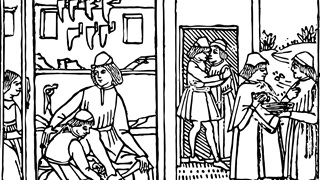
The Decameron
Jeffrey Anderson on Boccaccio’s celebration of life | Issue 18 | 2020


In the last days of 2020, Jeffrey Anderson recounts three tales of medieval lockdown, from the twelfth to the fifteenth century, concluding with the most important lesson of all.
Remember the early lockdowns of 2020? Everyone had such ambitious plans for profiting from their enforced solitude. Reading Proust’s multi-volume A la recherche du temps perdu became such a trope that the Sunday Times started a column, ‘Beyond Proust’, to recommend books to read once you had come to the end of your temps perdu. Baking was also unavoidable, leading inevitably to the Covid Stone or Quarantine 15 weight gain. But of course we weren’t the first people to have, unexpectedly, a bit of time on our hands. In the medieval period, quite a few individuals were imprisoned for years, even decades, after being captured in war or taken as hostages. There are horrifying stories of prisoners suspended in iron cages or murdered, but more often prisoners of royal or noble rank were treated well, since they could be used to gain concessions. Many had comfortable surroundings and ample opportunities to use their enforced isolation productively.
Here, then, are a few tales of medieval lockdown for our straitened times.
The overachiever
In 1191, King Richard I, ‘the Lionheart’, offended Leopold Duke of Austria on the Third Crusade (it’s a long story) and Leopold retaliated by capturing Richard on his way back to England and selling him to the Holy Roman Emperor Heinrich VI. Richard was imprisoned in the castle of Trifels. And what did he do? He appeared before the Emperor’s court and charmed the barons until they demanded his release; offhandedly coordinated an international alliance against King Philip Augustus of France (with whom Richard had also fallen out on the Third Crusade); wrote the twelfth-century ballad No One Who is in Prison; foiled his brother Prince John’s schemes in England (sadly without the assistance of the purely fictional Robin Hood); and returned home in triumph. If only there had been social media in the twelfth century, Richard would have been a star.
The wastrel
In the fourteenth century, King Jean II was captured at the Battle of Poitiers (in 1356) and taken to London. The English, having thrashed France in two battles in the Hundred Years War and shown their military superiority, now decided to show their cultural superiority. Jean was lodged with great honour at the Savoy Palace (site of the Savoy Hotel) and entertained magnificently by King Edward III. So magnificently, in fact, that after being released on condition he provide hostages and pay a heavy ransom, he jumped at the first opportunity—one of the hostages escaped, the ransom payments were late—to return to imprisonment in England. The uncharitable (like me) would say that he happily left his economically devastated kingdom to return to rounds of feasting and fun. Jean died within six months of returning to captivity, reportedly from overindulgence. A lesson for us all.
The poet
Charles Duke of Orleans was captured at the Battle of Agincourt in 1415 and held prisoner in England until 1440. He resided at various castles including the Tower of London, but his captivity seems to have been comfortable, and Charles took the opportunity to write books of brooding verse in French and English. If he didn’t enjoy captivity, he certainly made the most of this opportunity for reflection, not least since he missed out on the war in France in which he should have been a major protagonist. A splendid miniature from the presentation copy of his poems shows Charles dressed in an ermine-trimmed robe writing at his desk in the Tower of London and gazing out from his window at the fairytale spires of the medieval city. Perhaps he was writing his celebrated poem En la forêt de longue attente, about wandering through life as a traveller trying to find lodgings at ‘L’hôtellerie de Pensée’ (the Thought Hotel).
Charles reminds us of the most important lesson of all: even if the body can be imprisoned, nothing can restrain the mind!
Jeffrey Anderson is the author of The Angevin Dynasties of Europe 900—1500 (published by Robert Hale in 2019).
© Norton Rose Fulbright LLP 2025